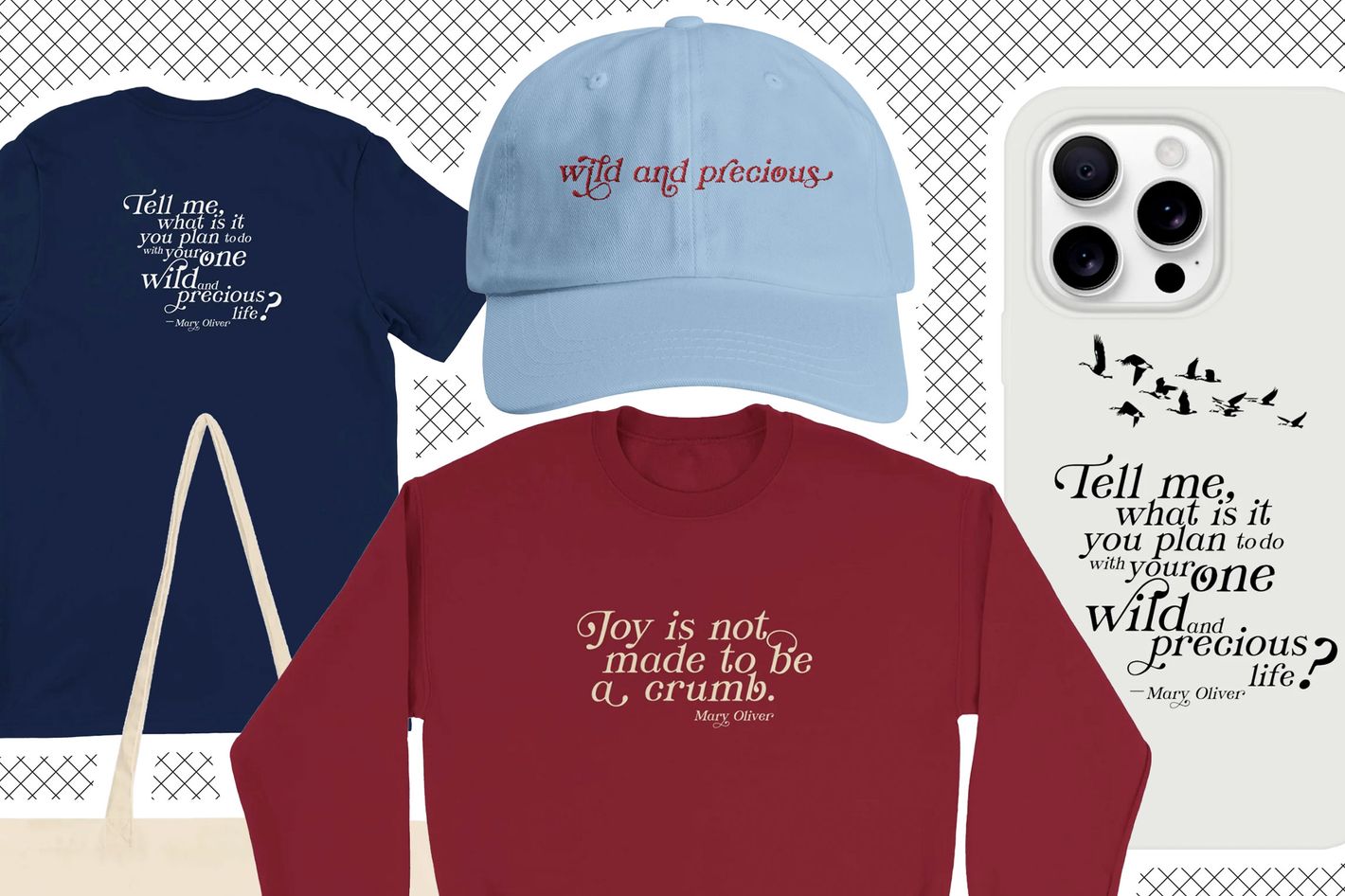Mary Oliver Now Has A Merch Store, And She’d Hate It

Photo-Illustration: by The Cut; Photos: Mary Oliver Shop
Last month, the Mary Oliver estate launched a merch store — now, for just $35, you can wear a cropped tee that reminds you to give in to joy.
On the site, Oliver’s poetry is gentle, pastel, and printed on goods with an estimated delivery date of 12 to 14 business days. Like a cream tote bag that whispers soft-animal truths as you carry your groceries. A minimalist baseball cap that assures the world (and possibly yourself) that joy is not a crumb. “Created with care and intention,” the Facebook announcement reads, “this storefront gives fans and readers a way to carry Mary’s words out into the world — spreading joy, reflection, and peace wherever they go.”
The actual designs are perfectly fine. They look like all the other embroidered hats and printed sweatshirts available to purchase online. You can get a flock of geese on a baseball cap or phone case surrounding Oliver’s name in that cursive font everyone uses for wedding stationery. She’d hate it.
Oliver’s work offered sanctuary from the marketplace, not entry into it. She didn’t tweet or posture. She walked and watched. She noticed things and made noticing feel sacred. She wrote about geese and rivers and blackberries — not as metaphors to be performed, but as wonders to be witnessed. Her poems were quiet refusals. She left the party early, wandered into the woods, knelt in the grass.
Now her words are a sort of spiritual branding perfect for selfies.
It’s more than simple commercialization. The shop — not to mention the scores of unofficial Mary Oliver–printed merch available online — reveals how our culture has perfected the alchemy of turning even our most intimate experiences, like being moved by a poem, into performative identity markers. We don’t just read Oliver, we wear her. And in doing so, we risk reducing her to a soft-lit, bird-watching, meadow-walking vibe, quiet but curated.
“A poem is a kind of dwelling place — intimate and durable,” writes Debra Dean Murphy. “And Oliver constructs poems that invite us to dwell in other habitations more thoughtfully, more honorably, with more integrity and intentionality than we might otherwise.” But dwelling is slow, and it doesn’t get engagement.
Still, I get it. First of all, the Mary Oliver estate has to make money. Secondly, we want to connect, to live deliberately. We desperately want to kneel in the grass and mean it. And sometimes, we just want to feel a little closer to what we love. But buying the tote doesn’t just mean you admire Oliver’s work — it says you are a certain kind of person. It folds aspiration into identity, and identity into display.
I think often about how impossible it feels to be earnest without feeling like a marketer. I’m writing this on a MacBook, in a home filled with objects that signal a kind of taste: my linen curtains, my stack of library books, my baseball cap from an independent bookstore. My kids’ wooden, open-ended toys sprinkled across the living-room floor. The fact that they look great in a photo doesn’t make them less meaningful. It just makes everything a little more slippery.
My morning runs, my grief, my joy — they’ve all been content, at some point. Not for money, maybe, but for attention, connection, and proof that I’m living a life worthy of the quote on the Mary Oliver coffee mug.
Even this essay, I know, is part of that cycle. And yet, I want to believe not everything has to be for sale.
A poem can be a product, yes. But it can also be a prayer, a resistance, a small doorway back to something unsellable, something quiet and alive. Maybe the question isn’t what we buy or wear, but what we still believe. We don’t need to carry Oliver’s words into the world. We just need to sit still long enough that they carry us.
Her most famous question — What is it you plan to do with your one wild and precious life? — isn’t asking what you’ll post, or wear, or monetize. It’s asking what you’ll notice. What you’ll love without needing to be seen loving it.
We don’t need to wear the poem; we need to live it.
Related


